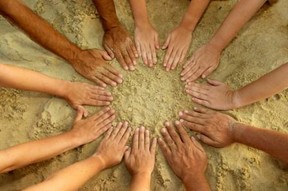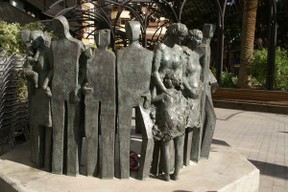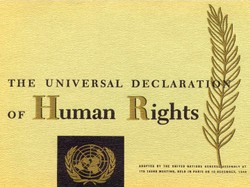 Yesterday my cousin was showing me his company manual, which was in the process of being up-dated. My eyes skimmed the text of one page and I burst out laughing.
Yesterday my cousin was showing me his company manual, which was in the process of being up-dated. My eyes skimmed the text of one page and I burst out laughing.
He was trying to tell his employees that no-one would be discriminated against due to factors like disability, race and ethnicity, sex, gender, sexual orientation, age et al. But, somewhere between the proof-reader and the printer, a word had been dropped. It changed the whole nature of the document by triggering the dual meaning of 'sex'.
"So you won't have anything to say if people are having sex on the job?"
"Huh?"
We checked the original. That should have read 'sex, gender alignment, sexual orientation'. In short, he was declaring equality amongst his workers, regardless of whether they were male, female, transsexual, transgender, bi-gender or any other gender-related designation. They were also fine if they were heterosexual, bisexual, pan-sexual or homosexual.
He would probably have produced this document anyway, because he's a good man and a great employer. However, as a Briton, he also has to obey certain laws, as he runs his business. One of those is to ensure that policies like this exist in every workplace in the country.
It is part of our civil rights.


 Yesterday my cousin was showing me his company manual, which was in the process of being up-dated. My eyes skimmed the text of one page and I burst out laughing.
Yesterday my cousin was showing me his company manual, which was in the process of being up-dated. My eyes skimmed the text of one page and I burst out laughing.


 Human Rights is an over-arching term, covering a broad range of safeguards, laws and ideals, of which civil rights is merely one part.
Human Rights is an over-arching term, covering a broad range of safeguards, laws and ideals, of which civil rights is merely one part.








 St Tydecho's Churches in West Waleson 09/03/2014
St Tydecho's Churches in West Waleson 09/03/2014
 Goodies for an Outlander Premiere Partyon 03/06/2015
Goodies for an Outlander Premiere Partyon 03/06/2015
 Holocaust Memorial Day Interview with Rainer Höss, Grandson of Rudolf Architect of Auschwitzon 01/24/2015
Holocaust Memorial Day Interview with Rainer Höss, Grandson of Rudolf Architect of Auschwitzon 01/24/2015
 Romantic Valentine Gifts for an Outlander Fanon 01/16/2015
Romantic Valentine Gifts for an Outlander Fanon 01/16/2015



Comments
I love that Benjamin Franklin quotation, that's on the first t-shirt: 'Those who sacrifice liberty for security, deserve neither.' He was a very astute man.
At the last British general election, many of my disillusioned friends were saying that they weren't going to vote. It was a two-horse race between two parties, which were both infested with Thatcherism. I was laughed at for being determined to vote anyway.
One of my friends said, "Why are you even bothering?"
My answer was, "Because Emily Wilding Davison left me no choice." How can any woman be too apathetic to join the electorate, when a woman died to give us the right to do so?
I'm glad that you liked this. :D
Thank you for reminding us of the sacrifices our historical and present women have made to insure our rights. Its a passionate gift they have given us and I feel we should uphold their work, sacrifices and press on as you and I both realize the work that remains! love Love LOVE this piece!
That always happens in academic writing. I remember during my dissertation spending days researching and defining a) the difference between a religion and a cult (there isn't one); and b) describing precisely what I meant by 'religion'. Get those things wrong and the paper is sunk before you even start. LOL
I get the feeling that if society didn't manufacture so many distinctions and 'normal behaviour' onto people, based solely on their genitals, then we wouldn't require quite so many words to describe all of the nuances!
You ramble away. I always enjoy your comments.
This is relevant to a paper I wrote just this past week :D
I was writing about transsexuals mainly, but I also included discussion of transgendered persons as well. It took me a bit to choose my terms, because they are sometimes used synonymously, sometimes very clearly not, and they all have specific definitions depending on what my source literature was. So I had to stop a take a minute and just set out a page of terms that I had to define before I could start writing. I didn't want to be switching back and forth between terms in the paper itself, and I wanted to avoid confusion in term ideas. Anyways, long story short I really liked something I came across in defining sex and gender. Sex refers specifically to the reproductive organs of an individual, (and of course the inherent double entendre ;p), gender refers to the the behavioral, cultural, or psychological traits typically associated with an individual's sex, but I preferred the definition of the state of being feminine or masculine according society's or culture's alignment with the idea of what feminine and masculine is (the first is a lot better technically, its a long story behind why I preferred the second). Finally gender roles would be the expectations set upon a specific sex to fulfill certain roles set out for their associated gender. (I needed that to defend specifically why I was using the term transsexual as opposed to transgender, and to explain how I was technically defining each, although it can all be quite confusing. XD You know what's funny about grad school? I have to defend definition of terms in papers, I can't just use words anymore >.> Why?! lol).
Anyways, sorry for all of the rambling, (thank you for always putting up with it) :D It is Thursday, I get to do my leisure reading. Yay. Internet blogs are taking over XD I'm not reading as many books as I normally do. LOL
...I really enjoyed your article! <3
Thank you very much.
Pan-sexual means no gender specific attraction. It differs from bisexual in that the latter choose only male or female. Those who identify as pan-sexual also include attraction to transsexual, bigender and trans-gender people. I had to ask as well, before I was educated on the subject by a teenager!
Excuse my ignorance, but what is 'pan-sexual'? Great article by the way :)